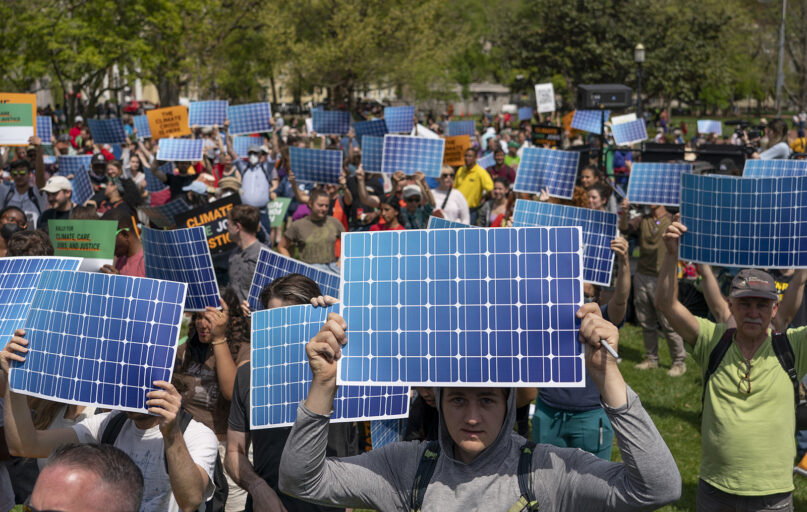One of the meeting's top priorities was to explain how faith communities can better use federal funds for clean energy initiatives.

Activists display prints replicating solar panels during a rally to mark Earth Day at Lafayette Square, Washington, April 23, 2022. (AP Photo/Gemunu Amarasinghe, File)
August 14, 2024
By Chloë-Arizona Fodor
(RNS) — The White House hosted more than a dozen faith leaders Tuesday (Aug. 13) to discuss President Joe Biden’s climate-related goals and how faith-based organizations can benefit from and support the administration’s climate agenda as the presidential election approaches.
One of the meeting’s top priorities was to explain how faith communities can better utilize federal funds for clean energy initiatives.
Houses of worship are eligible to use Direct Pay, a provision through the Inflation Reduction Act that helps tax-exempt entities benefit from federal clean energy tax incentives by issuing payments equal in value to tax credits. The system is meant to encourage nonprofits and other entities to proactively build clean energy projects. Religious leaders in attendance from across the country shared stories of the different ways their congregations have used Direct Pay, from increasing energy efficiency to preparing for natural disasters.
“The main thrust of the whole meeting was to help us religious leaders understand the initiatives well enough to go back to our various communities and share how they can get on board,” explained the Rev. Betty Holley, a presiding elder in the African Methodist Episcopal Church in the Ohio Conference and professor of environmental ethics at Payne Theological Seminary.
Holley said the event aimed to help faith communities “be good stewards of what God has given us.”
“After the meeting, I was ready to go out with a sign saying ‘follow me to clean energy!'” she said.

Attendees of the White House Faith Leaders Convening on Climate, Clean Energy and Environmental Justice event pose together, Aug. 13, 2024, at the White House in Washington. Taylor-Rae West, far left, and the Rev. Betty Holley, fourth from right, were among those present. (Photo courtesy of Taylor-Rae West)
RELATED: The religion of opposing government climate action
Environmental technology and clean energy organizations also presented at the event to highlight collaborations with faith-based partners and seek more.
Bekah Estrada, Southern California director of California Interfaith Power and Light, was among attendees, representing the organization which engages faith communities in environmental stewardship and climate action.
Taylor-Rae West, an organizational leadership major at Langston University, intern at Reworld Waste and AME Church member, said that Reworld reaches out to churches in local communities when power grids go down due to natural disasters exacerbated by climate change. He described various initiatives begun by churches using funds from Direct Pay, such as energy audits and installation of electric vehicle charging equipment, biomass stoves, solar water heating and other energy efficient upgrades to worship buildings. West said that when natural disasters hit, many people are more comfortable “going to their homes of faith rather than a local community center.”
Another example of Direct Pay utilization included battery storage updates, which allow houses of worship to retain energy even when power grids are hit.
“One group talked about how they became a resilient community church. People could come to them to get their phones recharged, to get their medication stored in a battery-operated refrigerated machine, both of which were one of the church’s projects through this IRA initiative,” Holley said.
Holley believes that the initiative has helped level the playing field for many communities.
“I do know for a fact that renewable energy is the way for the future, and if we — the African American community, Indigenous persons and people of color — do not avail ourselves of this knowledge, energy companies will take advantage of us,” she said.
Holley believes that religious leaders should be a “beacon” for their communities in the environmental movement. If someone’s local church is involved in renewable energy, “that’s half the battle,” and parishioners will follow the church leadership.
“We’re looking toward sustainability. How can we sustain ourselves on earth?” she said. “You know, we all have but one home and one future, and we need to be able to get on board now, before we are forced to do this.”
The White House said that partnerships with faith leaders will continue to be a priority for the Biden-Harris administration.
No comments:
Post a Comment